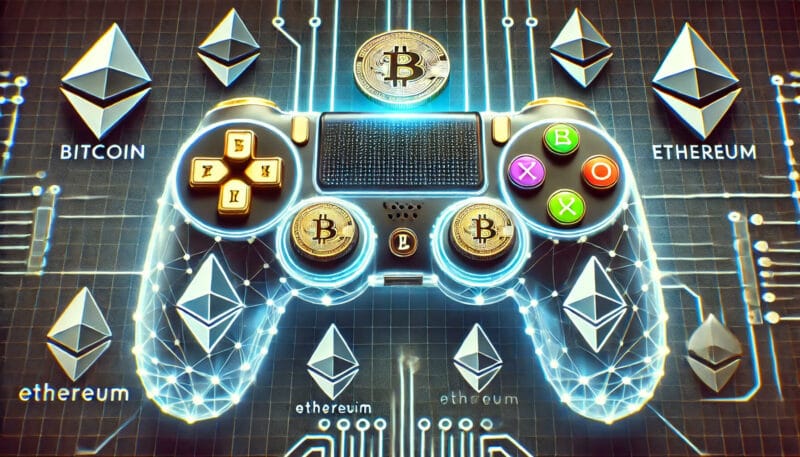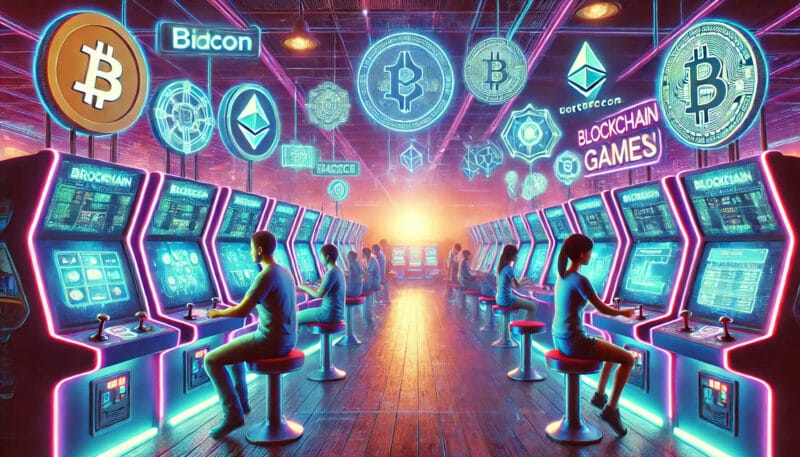1. Introduction: The Evolution of the Gaming Industry
The gaming industry has undergone significant transformations over the years, evolving from simple 2D arcade games to complex, immersive virtual worlds. With the advent of the internet, online gaming took the industry to new heights, allowing players to connect globally and participate in multiplayer experiences. However, the integration of cryptocurrencies and blockchain technology is poised to usher in the next era of gaming. Cryptocurrencies are not just creating new revenue models; they are also empowering players with true ownership of in-game assets, enabling decentralized economies, and fostering a more transparent and secure gaming environment. As a result, the gaming industry is experiencing a paradigm shift that could redefine the way games are developed, distributed, and played.
Why Cryptocurrencies Matter for the Gaming Industry:
Cryptocurrencies provide gamers with true ownership of digital assets, enable decentralized economies, and create new revenue models for developers and players alike.
2. The Role of Cryptocurrencies in the Gaming Industry
2.1 Enhancing Player Ownership of In-Game Assets
One of the most significant changes brought about by cryptocurrencies in gaming is the concept of true ownership of in-game assets. Traditionally, players could purchase or earn digital items, but they never truly owned them—game developers retained control. With the integration of blockchain technology, players can now own, trade, and sell in-game assets independently of the game itself. These assets, often represented as non-fungible tokens (NFTs), are stored on the blockchain, providing players with verifiable proof of ownership. This not only empowers players but also creates new opportunities for trading and monetizing digital assets.
- Key Benefits:
- True Ownership: Players have full control over their in-game assets, independent of the game developers.
- Asset Trading: Players can buy, sell, and trade assets on various marketplaces, creating a new economy.
- Verifiable Ownership: Blockchain provides proof of ownership, ensuring the authenticity and uniqueness of assets.
2.2 Creating New Revenue Models
Cryptocurrencies are also transforming the revenue models in the gaming industry. Traditionally, game developers relied on one-time purchases, in-game purchases, or subscription models to generate revenue. With the introduction of cryptocurrencies, new revenue streams are emerging. For example, some games allow players to earn cryptocurrency rewards by completing in-game tasks, participating in tournaments, or contributing to the game’s ecosystem. Additionally, players can monetize their skills by selling or renting out rare in-game assets, creating a new market for digital goods. This shift not only benefits players but also provides developers with alternative ways to fund game development and foster player engagement.
- Key Benefits:
- Crypto Rewards: Players can earn cryptocurrencies by participating in games, tournaments, and other activities.
- Monetizing Skills: Players can sell or rent out valuable in-game assets, generating income.
- New Funding Models: Developers can explore alternative revenue streams, such as crowdfunding through token sales.
2.3
Blockchain technology enables the creation of decentralized gaming platforms, where players have a say in the development and governance of the game. These platforms often operate as decentralized autonomous organizations (DAOs), where players and developers collaborate to make decisions on game updates, new features, and community rules. Decentralization also extends to the in-game economy, where players can trade assets and currency without relying on centralized intermediaries. This decentralized approach not only enhances transparency and security but also fosters a more inclusive gaming ecosystem.
- Key Benefits:
- Player-Driven Governance: Decentralized platforms allow players to participate in decision-making processes.
- Transparent Economy: Blockchain ensures transparency in transactions and reduces the risk of fraud.
- Inclusive Ecosystem: Decentralization fosters a more inclusive and community-driven gaming environment.
2.4 Enhancing Security and Reducing Fraud
The gaming industry has long struggled with issues of security and fraud, particularly in online multiplayer games where cheating, account hacking, and fraudulent transactions are common. Blockchain technology addresses these issues by providing a secure, transparent, and tamper-proof environment. Transactions on the blockchain are encrypted and recorded on a decentralized ledger, making it nearly impossible for hackers to alter or manipulate data. This enhanced security not only protects players but also builds trust within the gaming community.
- Key Benefits:
- Secure Transactions: Blockchain ensures that all transactions are encrypted and tamper-proof.
- Reduced Fraud: The transparent nature of blockchain reduces the risk of cheating and fraudulent activities.
- Trustworthy Environment: Enhanced security builds trust between players and developers.
3. The Impact of Blockchain and Cryptocurrencies on Game Development
3.1 Tokenization of Game Assets
The tokenization of game assets is one of the most significant impacts of blockchain on game development. By tokenizing assets, developers can create unique, verifiable, and tradeable items that players can own and transfer across different games. This cross-game compatibility opens up new possibilities for game development, where assets can be used across multiple games or even platforms. For example, a rare sword earned in one game could be used in another, creating a seamless experience for players and increasing the value of in-game items.
- Key Impacts:
- Cross-Game Compatibility: Tokenized assets can be used across different games and platforms.
- Increased Asset Value: Tokenization enhances the value and utility of in-game items.
- Innovative Game Design: Developers can explore new game mechanics and features using tokenized assets.
3.2 Crowdfunding and Game Development

Blockchain technology also enables new methods of funding game development through Initial Coin Offerings (ICOs) or token sales. Developers can raise funds by issuing tokens that represent ownership or access to in-game assets, allowing players to invest in the game’s success. This crowdfunding approach not only democratizes game development but also aligns the interests of developers and players. Players who invest in a game’s development are more likely to stay engaged and contribute to its growth, creating a more vibrant and dedicated community.
- Key Impacts:
- Democratized Funding: Token sales allow players to invest in the development of games.
- Aligned Interests: Players and developers share a vested interest in the success of the game.
- Vibrant Community: Crowdfunding fosters a more engaged and dedicated player base.
4. Challenges and Considerations for Crypto Integration in Gaming
4.1 Regulatory and Legal Challenges
As with any emerging technology, the integration of cryptocurrencies in gaming faces regulatory and legal challenges. Different countries have varying regulations regarding cryptocurrencies, and game developers must navigate these complexities to ensure compliance. Additionally, issues such as taxation, money laundering, and consumer protection need to be addressed to create a safe and legal environment for crypto gaming.
- Key Challenges:
- Regulatory Compliance: Developers must navigate complex regulations across different jurisdictions.
- Taxation Issues: The use of cryptocurrencies in gaming raises questions about taxation and reporting.
- Consumer Protection: Ensuring the safety and protection of players in crypto gaming environments is essential.
4.2 Scalability and Technical Challenges
Scalability is another challenge for the integration of blockchain in gaming. As more players participate in blockchain-based games, the network may experience congestion, leading to slower transaction times and higher fees. Developers must address these technical challenges by exploring solutions such as layer 2 scaling, off-chain processing, and more efficient consensus mechanisms to ensure a smooth and scalable gaming experience.
- Key Challenges:
- Network Congestion: Increased player activity can lead to slower transactions and higher fees.
- Scalability Solutions: Developers must explore technical solutions to improve scalability.
- User Experience: Ensuring a seamless gaming experience despite technical challenges is crucial.
5. The Future of Gaming with Cryptocurrencies
5.1 Mainstream Adoption of Crypto Gaming
As cryptocurrencies and blockchain technology continue to evolve, we can expect to see mainstream adoption in the gaming industry. Major game developers and publishers are already exploring the integration of blockchain into their games, and as the technology matures, more games will likely incorporate cryptocurrencies. This mainstream adoption will not only transform the gaming industry but also drive the broader adoption of cryptocurrencies in other sectors.
- Key Trends:
- Increased Adoption: More game developers will integrate cryptocurrencies into their games.
- Mainstream Acceptance: Crypto gaming will become a standard feature in the gaming industry.
- Broader Impact: The adoption of cryptocurrencies in gaming will drive their use in other industries.
5.2 Evolution of Decentralized Gaming Platforms
Decentralized gaming platforms will continue to evolve, offering players more control, ownership, and participation in the gaming experience. As blockchain technology advances, these platforms will become more sophisticated, providing new opportunities for innovation and collaboration. Players will have the ability to shape the future of gaming through decentralized governance, creating a more inclusive and democratic gaming ecosystem.
- Key Trends:
- Advanced Decentralization: Gaming platforms will become more decentralized and player-driven.
- Increased Collaboration: Players and developers will collaborate more closely on game development.
- Democratic Governance: Decentralized governance will allow players to have a direct impact on the future of gaming.
Conclusion: Cryptocurrencies as the Future of Gaming
Cryptocurrencies are transforming the gaming industry by introducing new revenue models, enhancing player ownership, and enabling decentralized economies. While challenges such as regulatory compliance and scalability remain, the potential benefits of integrating cryptocurrencies into gaming are too significant to ignore. As the technology continues to evolve, cryptocurrencies will play an increasingly important role in shaping the future of digital gaming, creating a more transparent, secure, and inclusive gaming environment for players and developers alike.
For more insights and detailed analysis on how cryptocurrencies are transforming the gaming industry, explore our Crypto and Gaming Guides section.
Stay Updated
For the latest updates on crypto gaming and blockchain technology, follow us on:
Stay informed with the latest strategies and insights in the world of cryptocurrency and gaming at FreeCoins24.io.
Special Offer
Looking to explore blockchain-based games? Sign up on Bybit today and take advantage of up to $30,000 in deposit bonuses. Start gaming with cryptocurrencies on leading platforms.

















